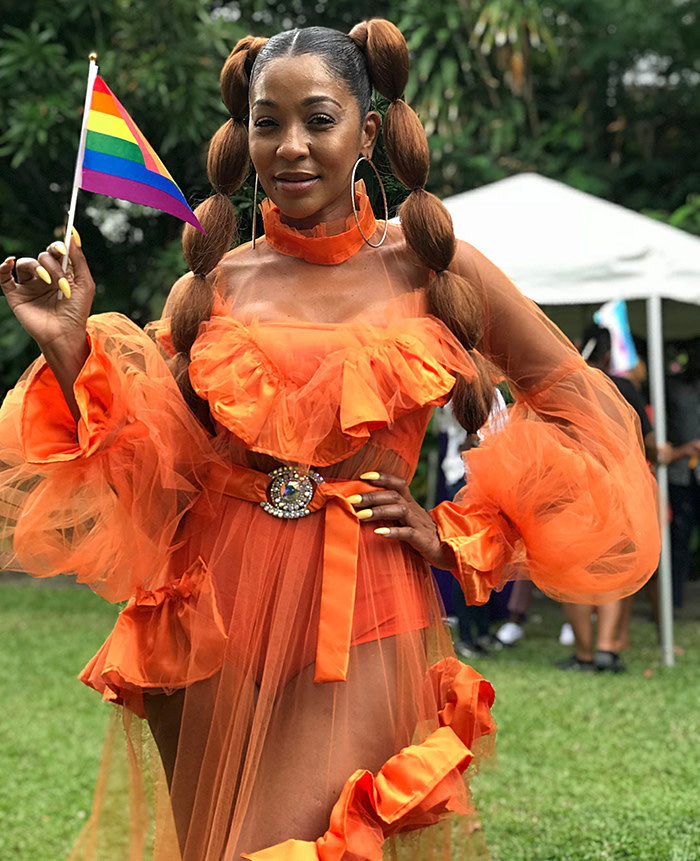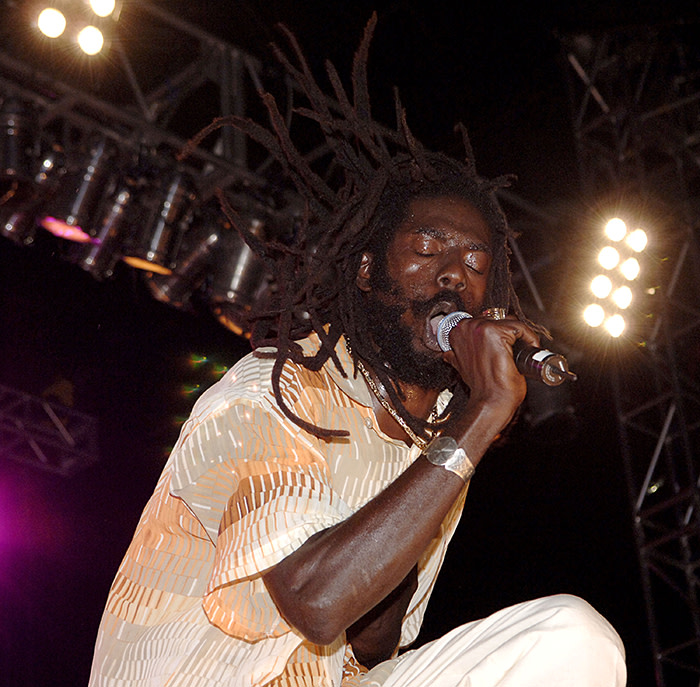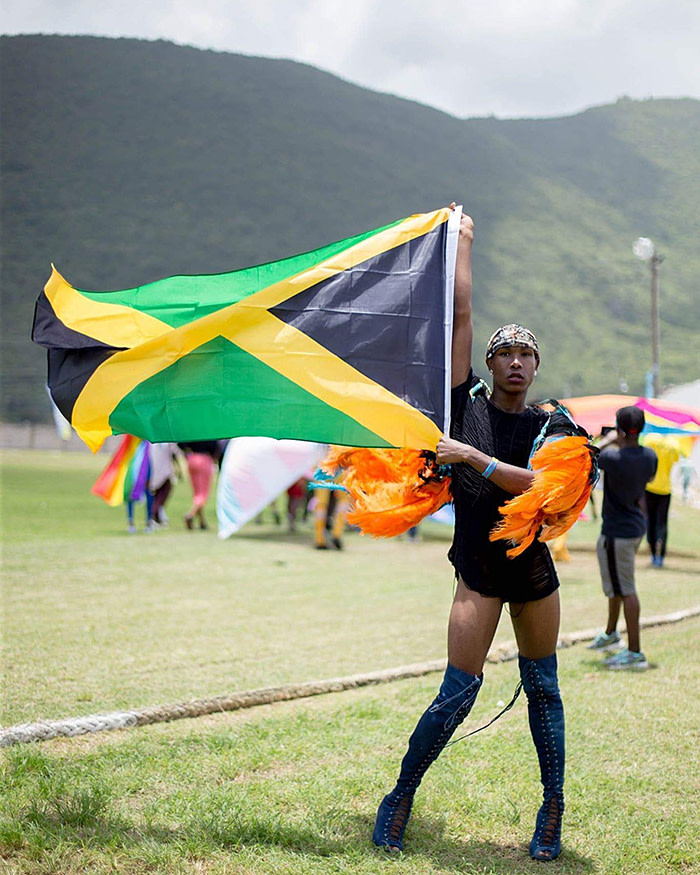Bye bye bigotry — does dancehall still have a homophobia problem?

Roula Khalaf, Editor of the FT, selects her favourite stories in this weekly newsletter.
It was midday when D’Angel took to the stage in Hope Gardens, Kingston, Jamaica. Dressed in orange with matching pigtails, she was a shock of colour against the greenery. So were the vibrant outfits of Jamaica’s LGBT community, there for the crowning event of the country’s fourth Pride week in July. D’Angel rapped and invited a trans woman in an elegant dress to twirl on stage. The crowd knew the words to every song.
D’Angel sings dancehall, an evolution of reggae that dominates Jamaica’s airwaves. Faster than its progenitor, with lyrics rapped in Jamaican Patois, the genre has filtered into the international mainstream via the pop fusions of Rihanna, Sean Paul and Drake. Despite dancehall’s popularity on the island, D’Angel’s performance at Pride was still a surprise for many: this is a genre that has long been notorious for the brutal homophobia in its lyrics.
It was Beenie Man, D’Angel’s ex-husband, often called the “king of dancehall”, who sang: “I’m thinking of a new Jamaica, come to execute all of the gays.” He was one of several artists, among them Elephant Man, Sizzla and Vybz Kartel, who achieved success with music that advocated the burning, drowning and hanging of gay men. Most notorious is “Boom Bye Bye”, the 1988 hit by Buju Banton, with a chorus that celebrates shooting a gay man in the head.
Yet today, homophobic lyrics have almost disappeared from dancehall. Not everyone agrees why this has happened.
Jamaica has a history of hostility to sexual minorities. Between 2009 and 2012 the Jamaica Forum for Lesbians, All-Sexuals and Gays (J-Flag), the country’s most prominent LGBT activist group, documented 231 cases of homophobic violence and discrimination: the real figure is probably much higher. Openly gay public figures have been murdered, including fashion designer Dexter Pottinger and J-Flag co-founder Brian Williamson. After Williamson’s death, a crowd gathered in his street, cheering and chanting the lyrics to “Boom Bye Bye”.

In a country with troubling levels of poverty and unemployment, homophobic violence is only part of a high rate of general violence: in 2016 Jamaica had the fourth highest murder rate in the world, according to the UN. Anti-discrimination laws do not protect Jamaicans on the basis of sexual orientation or gender identity, while the “abominable crime of buggery”, as it was termed by a colonial-era law, is punishable by up to 10 years in prison. Given the widespread vilification of LGBT people, it is not surprising that homophobia entered Jamaica’s most prominent art form.
Dancehall is not just a genre of music, it is a major cultural event. A whole economy revolves around the dancehall: dancers prepare fresh looks with the help of stylists, hairdressers and tailors, while a small army of technicians, DJs and mic men are enlisted for the party itself. The ritual of a proper downtown dancehall is highly codified, with discrete musical sections, including songs to get women on the dance floor, a gospel selection and the notorious “dash out”, where hips loosen and dance moves are at their most provocative.
The genre emerged in the early 1980s, a time of intense political violence, with raw lyrics that expressed the tough realities of daily life. Artists sang about sex as openly as they did about hardship. Their words reinforced a moral code, a conservative image of intercourse grounded in strong religious values. Songs like Notch’s iconic “Nuttin No Go So”, with its insistent bassline and catchy flow, is essentially a list of sexual dos and don’ts. It is one facet of the uncompromisingly traditional model of masculinity promoted in dancehall.
“We’re growing up in America’s backyard, receiving the idea that a man is supposed to be in control, to have money, to provide, to be autonomous,” says academic and activist Carla Moore. “[Black Caribbean men] don’t have that and they’ve never had that. And in that way they were feminised ideologically, treated as less than men, like children on the plantation. After the colonial project it becomes necessary for these men to establish boundaries that will never put them in the position again of being less than a man.”

Yet this does not diminish the impact these lyrics have on the lives of LGBT Jamaicans. In 2004, when homophobic dancehall was raging, J-Flag approached activist Peter Tatchell, then head of British LGBT rights group OutRage!, to ask for help. “J-Flag said, ‘You’ve got to help us — this music is killing us’,” Tatchell recalls.
OutRage! acted swiftly, stirring up a media buzz with its Stop Murder Music campaign, which put pressure on homophobic dancehall artists and encouraged a boycott of their international performances. This culminated in the Reggae Compassionate Act, which stated: “There’s no space in the music community for hatred and prejudice, including . . . sexism or homophobia.” It was signed by Beenie Man, Sizzla and Buju Banton, but others refused. Later, Buju Banton and Beenie Man denied ever signing.
The OutRage! campaign has a controversial legacy. Dancehall artists were able to resist it domestically because they gained respect by standing up to former colonisers. “It really came across as white people beating down on the Jamaican name,” says Jaevion Nelson, executive director of J-Flag.
Equally, though, it got the world talking about homophobia in Jamaica, and that had economic consequences. Touring represents a significant income source for big-name artists, while Jamaican festivals with international sponsors prohibit homophobic lyrics on stage. Many local musicians argue this financial hit is the primary cause for the recent disappearance of homophobia in dancehall.
Yet changes in Jamaican society also matter. J-Flag celebrated its 20th anniversary in December, and can reflect on a changing country where public figures are beginning to support LGBT rights. Pride week has been established and a legal challenge to the “buggery law” is in progress. Life is still hard for many LGBT Jamaicans, but “in five to 10 years the Jamaica we’re in now will look ancient”, predicts Glenroy Murray, J-Flag’s former associate director of programmes.
With these changes dancehall becomes a space that is less hostile to LGBT people. “Anyone who supports my music — no matter what class, creed, religion or sexuality — I embrace them just the same,” D’Angel says. These words may sound unremarkable, but in Jamaica they are new.
Despite this progress, around Jamaica homophobic dancehall songs continue to be played. However, in some quarters something subversive is happening: these very songs with their messages of hatred are being played by the LGBT community. In dancing, they reclaim the music and construct a queer identity that is also a Jamaican identity. The DJ might even play Buju Banton, says Moore. “People have come into themselves enough to know the repercussions of this music might make my life hard, but the words can’t hurt me.”
Follow @FTLifeArts on Twitter to find out about our latest stories first. Subscribe to FT Life on YouTube for the latest FT Weekend videos
Comments